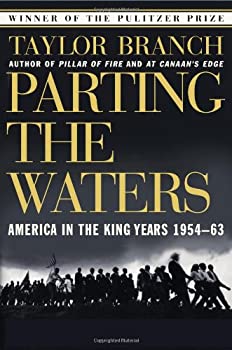FEBRUARY 6, 2021 – The Contest by Michael Schumacher (see blog posts, 1/17 and 1/22) tells about Bobby Kennedy’s encounter with two young volunteers for his opponent, Gene McCarthy. The run-in was at the airport in Indianapolis early in the morning after the state’s Democratic primary. Kennedy offered to buy breakfast in exchange for conversation. One of the volunteers was future Pulitzer Prize winner, Taylor Branch, who later said he was “bowled over” by Kennedy’s honesty and directness.
Schumacher’s mention of the encounter reminded me that among my stacks of “to-be-read” books was Branch’s three-volume account of the life and times of Martin Luther King, Jr. My bookstore-proprietor-bro-in-law had given me the set several years ago, but because of their daunting heft, the books had gone unread.
I’ve now waded deep into volume one: Parting the Waters: America in the King Years 1954-63. I can’t put it down.
The book begins with a riveting chapter about Vernon Johns, a larger-than-life, tour de force preacher at Dexter Avenue Baptist Church in Montgomery and whom MLK succeeded in 1953. The second chapter tells the remarkable tale of John D. Rockefeller (his wife’s family home in Ohio had been a stop on the Underground Railroad) and the founding and funding of prestigious, all-Black Spelman and Morehouse Colleges in Atlanta; the tie-ins with Ebenezer Church, where MLK’s grandfather and father were legendary preachers. Next up: “Niebuhr and The Pool Tables,” which provides a “page-turner” account of MLK’s extraordinary education at Crozer Theological Seminary in Chester, Pennsylvania. (Spoiler alert: it made me feel like a rank ignoramus.)
February is “Black History Month.” In my past, white, “liberal” naiveté, I’d viewed this designation with only passing interest; a time for Blacks to celebrate Blackness or perhaps for white liberals to celebrate Blackness. Well into my mind-blowing journey with Taylor Branch, I’m in full agreement with Morgan Freeman, who criticized Black History Month. “I don’t want a Black history month,” he said. “Black history is American history.” His point: “Black history” needs to be fully integrated with “American history.” My point: we Americans are shamefully ignorant.
That indictment includes me—an undergraduate history major. Much of American history is not something to “celebrate.” It’s a sordid affair to be studied in depth for its troubling and complicated realities; studied by all Americans, regardless of race or ethnic background. The greater imperative, however, is for white people to read, devour, synthesize American history and with a critical eye. This perspective isn’t “self-flagellating”—much of human history comprises violence, ignorance, injustice, and inhumanity. The point of studying the negative is to ameliorate the human condition.
The American story as an integrated whole can be grasped only through the lens of slavery, Reconstruction and its intentioned failure, Jim Crow, the Great Migration, institutionalized discrimination, and the Civil Rights Movement and its failure. America can’t be understood without studying “Black history,” any more than Europe can be understood without studying anti-Semitism.
Enough said. This month, read American history—Taylor Branch’s crowning achievement about . . . a King.
(Remember to subscribe to this blog and receive notifications of new posts by email.)
© 2021 by Eric Nilsson
